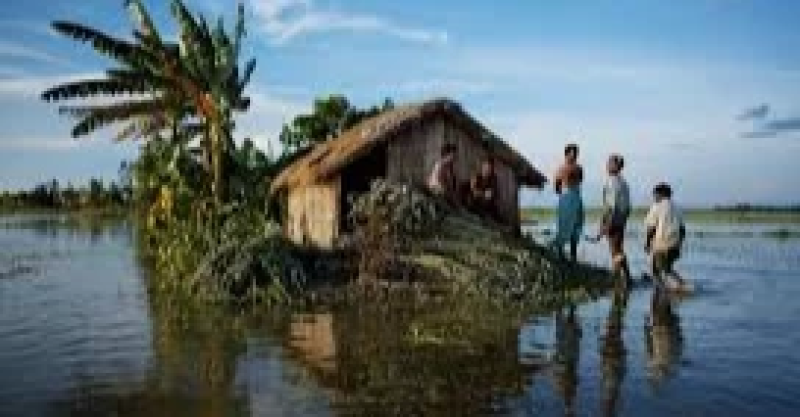- Bangladesh Lost $24B in 2024 as Extreme Heat Hits Economy |
- Remittance Surpasses $10b in Four Months of FY 2025-26 |
- Dhaka residents struggling with ‘unhealthy’ air quality |
- Over 100 Killed in Brazil’s Deadliest Rio Police Raid |
- Alphabet Tops $100 Billion Quarter as AI Drives Surge |
Climate Change and Health: A Call for Urgent Investment

Climate Change and Health: A Call for Urgent Investment
Bangladesh, often cited as a global hotspot for climate change, continues to face relentless waves of extreme weather and recurrent disasters. For a nation of 170 million people, these shocks bring not only physical harm but also a surge in vector-borne diseases and other health crises.
The impact falls hardest on the poor, who make up more than a quarter of the population and rely heavily on a fragile public health system. Lacking universal health insurance, most Bangladeshis bear medical expenses out of pocket — the second highest rate in South Asia after Afghanistan. Frequent illnesses linked to heat, floods, and disease outbreaks push vulnerable families deeper into debt and distress.
Among the most urgent threats is rising heat, particularly in urban areas like Dhaka. In overcrowded slums, millions live in cramped spaces surrounded by heat-trapping concrete, poor ventilation, and erratic electricity supply. During power cuts, residents spend sleepless nights outdoors, while many endure long hours of labour in overheated factories or on the streets. In rural coastal areas, farmers and informal workers also suffer as heatwaves parch the land and intensify each year.
Prolonged exposure to heat brings exhaustion, dehydration, and higher risks of heart disease, stroke, and skin disorders — adding to the growing burden of non-communicable diseases such as diabetes and kidney ailments, driven by unplanned urbanisation and unhealthy diets.
The summer now begins earlier and lasts longer, blending into the monsoon and creating ideal conditions for mosquito-borne diseases like dengue. Recent years have seen overlapping outbreaks of dengue and influenza, along with diarrhoea and heat-related illnesses. Unusual rainfall patterns have also triggered flash floods, causing injuries, skin infections, crop loss, and food insecurity.
For many farmers, a single lost harvest can mean hunger and debt. Others perish in lightning strikes, floods, or cyclones. Along the coast, salinity intrusion has made drinking water unsafe, worsening health outcomes and lowering income from fishing and farming.
Climate change is also straining mental health. As incomes fall and diseases rise, people face chronic stress and anxiety, often manifested in high blood pressure and depression — invisible wounds that rarely make headlines.
Bangladesh’s overcrowded hospitals and under-resourced rural clinics are ill-equipped to handle this growing climate-induced health burden. Many patients travel to cities for treatment, incurring travel costs and often borrowing at high interest rates. Each fever, drip, or hospital visit chips away at household income, turning personal illness into a wider social and economic crisis.
Rising out-of-pocket health expenses reduce productivity and life expectancy, creating long-term macroeconomic consequences. Investing in health, therefore, is not only a humanitarian necessity but also an economic imperative.
To build resilience, Bangladesh needs stronger early-warning systems supported by reliable meteorological data, expanded shaded public spaces, safe drinking water, and widespread awareness campaigns on heat management. Health insurance and social protection programmes must be broadened to prevent illness from driving families into poverty.
It is essential that health concerns be incorporated into climate adaptation strategies and reflected in national policy frameworks such as the upcoming National Social Security Strategy (NSSS) 2026 and its Action Plan.
Health must stand at the centre of Bangladesh’s climate agenda. Focusing solely on damaged crops or lost land overlooks the true human cost of climate change — exhausted workers, sick children, and fragile communities. When extreme weather makes people sick or claims lives, investing in health becomes indispensable for sustainable growth and national resilience.
Dr. Khondaker Golam Moazzem is a leading industrial economist and Research Director at the Centre for Policy Dialogue (CPD), Dhaka. He has over 30 years of experience in sustainable development, workers’ rights, and climate and energy policy, and advises government bodies and trade associations on inclusive and environmentally responsible policies.

